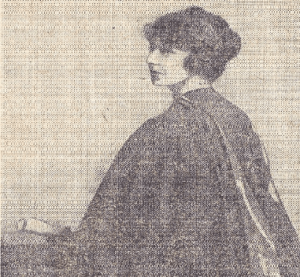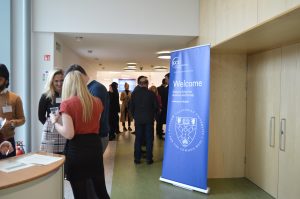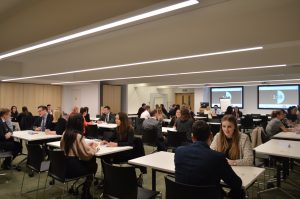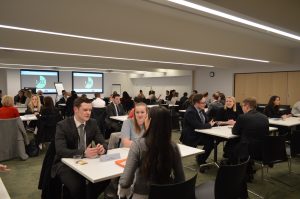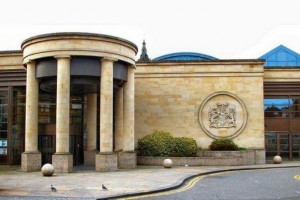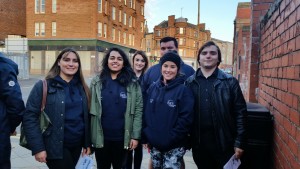James is currently a fourth year LLB student at GCU and, after completing a vacation scheme in summer 2022, James has secured a training contract at international commercial law firm CMS, commencing in August 2024. In this blog, James talks about his experience this summer.
Firstly, not everyone knows what they want to do with their LLB degree and that’s okay. You shouldn’t feel freaked out when people start mentioning grad jobs and training contracts.
This post is mainly to get first and second years thinking about the legal opportunities out there and give some insight into the recruitment process at big commercial law firms.
For me, I think I always really knew that I had a keen interest in commercial issues and business in general, so a career in commercial law was the best way to marry this together with my passion for the law. It’s not for everyone and you shouldn’t feel like you ought to be attracted to it just because people tell you “it’s where the real money is”.
This leads me on to my first key point; before you even start to think of applying for traineeships or internships, you must first get to grips with your personal motivations for pursuing the career path. These should be genuine and personal reasons, not just the standard clichés that grad recruiters will have heard a million times before.
After, in my experience, I think that you should research around 10 firms in depth, all the time being aware of your personal motivations and how a firm aligns with these. There are so many resources that you can use to do this out there such as Chambers Student, Legal Cheek and the firm websites. Additionally, don’t be afraid to reach out on LinkedIn (can’t believe I actually used that phrase!) to trainees at law firms to get some personal insight into the firm. You can use Law Fairs to do this too. I know it is quite daunting but I promise they are really just normal people and you won’t be the first or last to contact them about this. Plus, doing so gives you some insight that puts you ahead of so many other applicants.
This all does sound like a lot of work before you even get to writing an application. That’s why it is best to start as early as you can. For instance, at CMS the application window for the vacation scheme for the following Summer opens around the end of September and closes just before Christmas. I personally began my firm research around the start of August 2021 and submitted my various applications around early to late November – I promise I do actually have a life by the way!
This brings me on to one of the biggest things I learned during the application cycle; consistency compounds. What do I mean by that? No one can spend all day every day working on applications – it is not sustainable when you have other commitments like your studies, part-time work and a social life to balance. A couple hours of work most days is actually better than spending three days straight sweating it with deadlines approaching. I know people like to say they work best under pressure (another application cliché!) but traineeships or vacation schemes are incredibly competitive so you need to give yourself the best chance to submit as good an application as you can – this starts with being organised and committed.
On the subject of competitiveness, it is inevitable that you will face rejections. To give you an idea, I applied for around nine schemes and got rejected from seven of them – some at much smaller firms than the one I ended up in, and one time I just never heard back either way! Don’t take it personally; it is a simple fact that way more people apply for these positions than there are spaces on them. However, you should leverage rejections to show the resilience and motivation you possess and always back yourself – someone has to get the spot, so why should it not be you?
Finally, I would like to stress the value of non-legal work experience. The only real experience I had, apart from a week with the Procurator Fiscal way back in fourth year of high school, was my part-time job. In my experience this can be just as, if not more, valuable than a week of informal experience here or there doing admin work. Beyond having to manage your time and juggle different commitments, part-time work exposes you to the realities of the working world including managing relationships, working in a team and possibly being a leader of some description. So don’t think it’s not that relevant, it really can be if you frame it in the right way.
So good luck! Here’s some resources I found useful:
- Aspiring Solicitors
- Coaching programmes, mentoring schemes, virtual events, financial support from their foundation
And all of the below are great for developing commercial awareness:
- Watson’s Daily Podcast
- FT daily newsletters (use the university library for free subscription)
- The Corporate Law Academy newsletter
- Commercial Law Academy Newsletter
- Roll on Friday (try to avoid the forums full of unhappy lawyers looking for somewhere to vent!)
James Cox. LLB4, Glasgow Caledonian University
If you would like to speak to James about his experiences, he is happy for you to contact him JCOX202@caledonian.ac.uk

